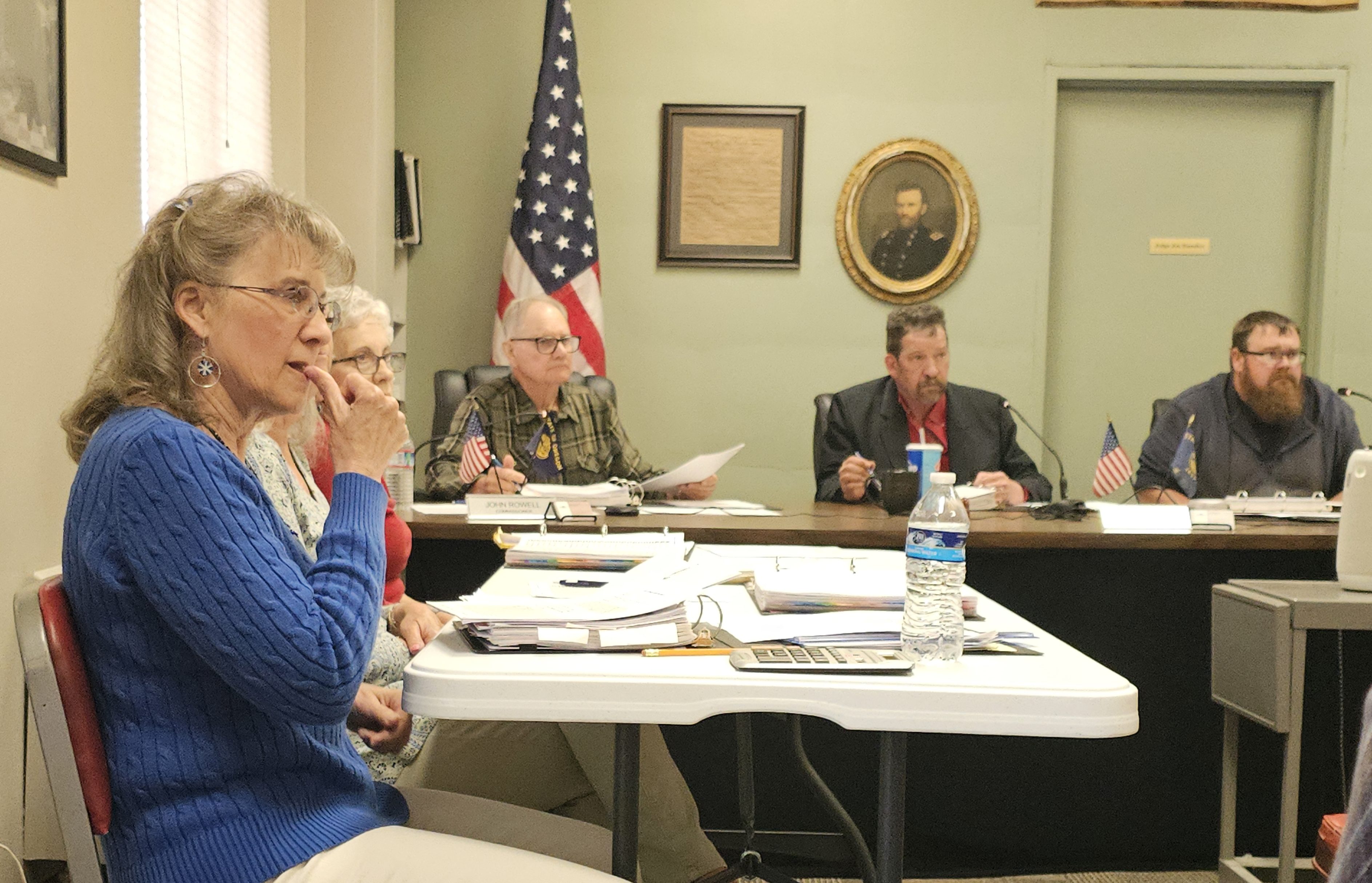Grant County firearms initiative challenged
Published 12:18 pm Tuesday, June 12, 2018

- Retailers that restrict long gun sales to customers 21 or older could be violating Oregon's anti-discrimination laws. Legislative leaders say they will consider legislation that would either shield retailers that choose to restrict gun sales, or raise the age for all gun purchases to 21.
An initiative aimed at prohibiting enforcement of laws that restrict gun possession in Grant County has been challenged and is awaiting a ruling by Grant County Circuit Court Judge William D. Cramer Jr.
In the meantime, Ron Rue of Prairie City, who submitted Measure 12-72 to Grant County Clerk Brenda Percy on May 3, has not been authorized to begin gathering signatures, Percy told the Eagle.
According to the summary provided by the Grant County District Attorney’s Office, Rue’s Second Amendment preservation ordinance, if approved by voters, would make unconstitutional in Grant County “any law or regulation that restricts a person from possessing firearms, ammunition and firearms accessories” and “would require the Grant County sheriff to review federal, state and local laws affecting firearms, firearms accessories and/or ammunition.”
The initiative also provides for a fine of up to $2,000 for an individual or $4,000 for a corporation for those who violate the measure.
A petition challenging Percy’s determination that Measure 12-72 should be placed on the ballot was submitted by Mark Webb of Mt. Vernon on May 14. Webb maintains that “given the scope of its subject matter,” Rue’s initiative “goes well beyond the matters of county concern” allowed under the state’s initiative process.
Rue told the Eagle his intent in submitting the initiative was to preserve the U.S. Constitution’s Second Amendment and to “save our gun rights.” He said he was also reacting to “what was happening in the Valley,” referring to two statewide initiatives that would limit magazine capacity and require gun owners to store firearms with trigger locks or in locked boxes.
Rue said he was also concerned about a growing nationwide political movement that followed several major school-shooting incidents this year. He said gun owners were being blamed and he was concerned gun-ownership rights could be impacted.
“It’s not guns that kill people — it’s people,” he said.
Rue said he wants to see existing regulations enforced, including background checks that would stop mentally ill people from possessing firearms.
This is the first time he’s worked on an initiative, he said, and he’s not politically active and not a member of the National Rifle Association. Rue said he obtained the language for his initiative from similar Second Amendment preservation initiatives submitted in six other counties in Oregon.
Webb said he’s a hunter, owns firearms and is a Second Amendment supporter. He grew up around guns as a child in Texas and once worked for an outfitter in the Eagle Cap Wilderness. He also said he was unaware of any statewide initiatives relating to firearms when he wrote his challenge to Rue’s initiative.
This is the second time Webb has challenged an initiative in Grant County. He said he learned about Rue’s initiative from an article in the May 9 Blue Mountain Eagle, and his challenge refers to the measure as presented in the summary published in the legal section of that same paper.
Webb believes that some of the initiative’s language is so broad that substantive legal changes to existing statutory and constitutional law will occur if it passes. Voters should be provided fair notice of that possibility under the “full text requirement” for prospective initiatives, he said.
For example, if county officials are prohibited from enforcing any law that restricts the right of people to possess firearms, ammunition and firearms accessories, then they would be unable to enforce existing laws that make it illegal for convicted felons or certain mentally ill people from possessing firearms. This could “significantly increase public safety risks for county residents,” Webb said in his challenge.
Requiring the sheriff to review federal, state and local laws affecting firearms would expand the sheriff’s statutory responsibilities to include judicial review, Webb also said. He noted that the Oregon Constitution prohibits individuals charged with the official duties of one branch of government from exercising any of the functions of the other two.
Webb also noted that state law requires initiatives “embrace one subject only,” but Measure 12-72 bundles four subjects: 1) redefining the constitutional definition of firearms to include ammunition and accessories; 2) making any gun-restricting law in Grant County unconstitutional; 3) expanding the sheriff’s statutory duties; and 4) prohibiting the sheriff from enforcing any law that restricts the right of people to possess firearms.
He also noted that county initiatives are limited to “matters of county concern,” and Measure 12-72 potentially conflicts with state and federal laws. State law, for example, states that “the authority to regulate in any matter whatsoever the sale, acquisition, transfer, ownership, possession, storage, transportation or use of firearms or any element relating to firearms and components thereof, including ammunition, is vested solely in the Legislative Assembly.”
Rue said he disagreed with Webb’s arguments. The initiative did not seek to change the U.S. Constitution but “to preserve it in its current state.” He also disagreed with Webb’s argument that the public did not receive fair notice.
In a May 31 declaration, Percy explained how she determined that Rue’s initiative met constitutional and statutory provisions. While she found that the petition measure satisfied those requirements, her decision “was not, however, without doubt.” She noted that the measure “lacked clarity and was subject to differing interpretations.”
“While the language is very general in nature, I assumed that it was limited in scope to only matters of county concern and was not an attempt to affect in any way the existing federal and state laws,” she said.
Percy said she sought legal advice from Grant County Counsel Ron Yockim about portions of the initiative and was told the Oregon Supreme Court had ruled “that when faced with such doubt, and the need to make assumptions, that any doubt should be resolved in favor of the exercise of the right of initiative.”
“As a result of this legal advice, I concluded that the measure could meet the tests and accepted the petition to be placed on the ballot in order to allow the public to debate the issue and in turn develop a clear understanding of the intent,” she said.
As for any potential impact on the sheriff’s duties, Percy said it was her interpretation “that this section did not legislatively amend the sheriff’s duties in any manner and at best it was purely administrative in nature.” She also noted that the only people likely to be subject to penalties for violating provisions of the initiative would be county officials.
Webb disagreed with Percy’s interpretation — store owners who refuse to sell firearms or ammunition and state police who enforce existing gun laws in Grant County might be found in violation of the initiative, he said. He also noted that it’s not the purpose of the initiative process to debate its interpretation.
“It should be clearly articulated to the voters,” he said. “That’s the full text requirement.”
Webb said Rue’s initiative likely will pass if it’s placed on the ballot, but it would be unenforceable under federal and state laws. Grant County already has similar laws, including a 1995 ordinance on management of public lands.
If the initiative becomes law, it likely will be challenged in court, Webb said. He successfully challenged the county ordinance establishing a Public Forest Commission in 2016, but he suspects Measure 12-72 will become a larger issue across the state and others will challenge it.





